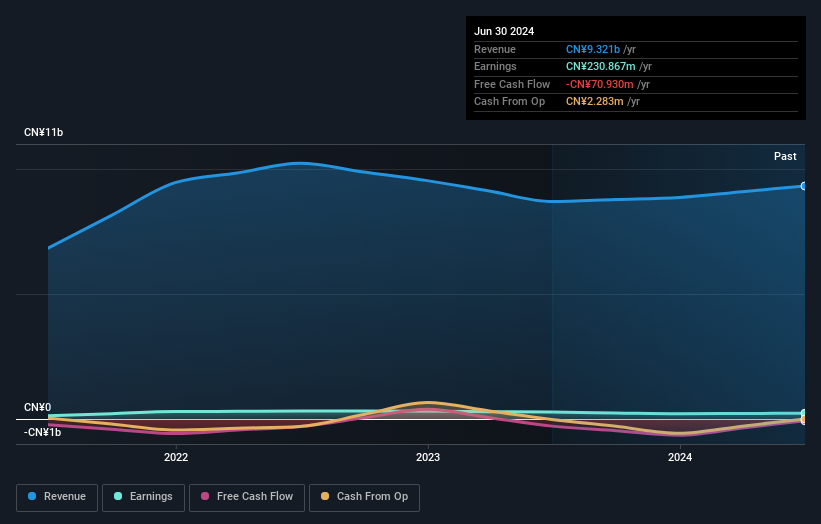Ingdan, Inc. (HKG:400) CEO Jingwei Kang, the company's largest shareholder sees 10% reduction in holdings value
Key Insights
- Significant insider control over Ingdan implies vested interests in company growth
- A total of 2 investors have a majority stake in the company with 60% ownership
- Past performance of a company along with ownership data serve to give a strong idea about prospects for a business
To get a sense of who is truly in control of Ingdan, Inc. (HKG:400), it is important to understand the ownership structure of the business. We can see that individual insiders own the lion's share in the company with 60% ownership. Put another way, the group faces the maximum upside potential (or downside risk).
As market cap fell to HK$1.7b last week, insiders would have faced the highest losses than any other shareholder groups of the company.
Let's delve deeper into each type of owner of Ingdan, beginning with the chart below.
Check out our latest analysis for Ingdan

What Does The Lack Of Institutional Ownership Tell Us About Ingdan?
Small companies that are not very actively traded often lack institutional investors, but it's less common to see large companies without them.
There are multiple explanations for why institutions don't own a stock. The most common is that the company is too small relative to funds under management, so the institution does not bother to look closely at the company. It is also possible that fund managers don't own the stock because they aren't convinced it will perform well. Institutional investors may not find the historic growth of the business impressive, or there might be other factors at play. You can see the past revenue performance of Ingdan, for yourself, below.

Hedge funds don't have many shares in Ingdan. The company's CEO Jingwei Kang is the largest shareholder with 47% of shares outstanding. Yi Yao is the second largest shareholder owning 13% of common stock, and Dimensional Fund Advisors LP holds about 0.7% of the company stock.
After doing some more digging, we found that the top 2 shareholders collectively control more than half of the company's shares, implying that they have considerable power to influence the company's decisions.
While studying institutional ownership for a company can add value to your research, it is also a good practice to research analyst recommendations to get a deeper understand of a stock's expected performance. We're not picking up on any analyst coverage of the stock at the moment, so the company is unlikely to be widely held.
Insider Ownership Of Ingdan
The definition of an insider can differ slightly between different countries, but members of the board of directors always count. Management ultimately answers to the board. However, it is not uncommon for managers to be executive board members, especially if they are a founder or the CEO.
Most consider insider ownership a positive because it can indicate the board is well aligned with other shareholders. However, on some occasions too much power is concentrated within this group.
Our most recent data indicates that insiders own the majority of Ingdan, Inc.. This means they can collectively make decisions for the company. That means they own HK$1.0b worth of shares in the HK$1.7b company. That's quite meaningful. It is good to see this level of investment. You can check here to see if those insiders have been buying recently.
General Public Ownership
The general public, who are usually individual investors, hold a 39% stake in Ingdan. This size of ownership, while considerable, may not be enough to change company policy if the decision is not in sync with other large shareholders.
Next Steps:
It's always worth thinking about the different groups who own shares in a company. But to understand Ingdan better, we need to consider many other factors.
Many find it useful to take an in depth look at how a company has performed in the past. You can access this detailed graph of past earnings, revenue and cash flow.
Of course, you might find a fantastic investment by looking elsewhere. So take a peek at this free list of interesting companies.
NB: Figures in this article are calculated using data from the last twelve months, which refer to the 12-month period ending on the last date of the month the financial statement is dated. This may not be consistent with full year annual report figures.
New: AI Stock Screener & Alerts
Our new AI Stock Screener scans the market every day to uncover opportunities.
• Dividend Powerhouses (3%+ Yield)
• Undervalued Small Caps with Insider Buying
• High growth Tech and AI Companies
Or build your own from over 50 metrics.
Have feedback on this article? Concerned about the content? Get in touch with us directly. Alternatively, email editorial-team (at) simplywallst.com.
This article by Simply Wall St is general in nature. We provide commentary based on historical data and analyst forecasts only using an unbiased methodology and our articles are not intended to be financial advice. It does not constitute a recommendation to buy or sell any stock, and does not take account of your objectives, or your financial situation. We aim to bring you long-term focused analysis driven by fundamental data. Note that our analysis may not factor in the latest price-sensitive company announcements or qualitative material. Simply Wall St has no position in any stocks mentioned.
About SEHK:400
Ingdan
Operates as a technology service platform for integrated circuit (IC) chips industry and artificial intelligence of things (AIoT) ecosystem in the People’s Republic of China and Hong Kong.
Adequate balance sheet with questionable track record.
Market Insights
Community Narratives



